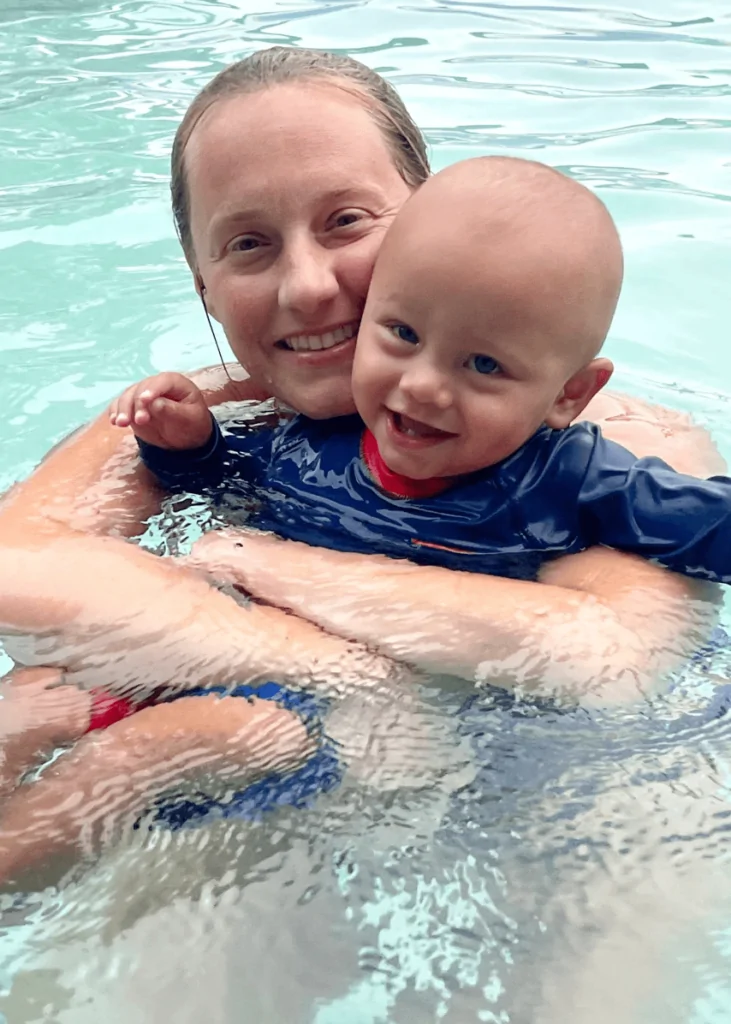Title: Rigby’s Water World Updates Policy in Support of Breastfeeding Rights.
The Rigby’s Water World regulations were changed as a result of a story about breastfeeding discrimination there that caused a big uproar.
The incident, which involved a nursing mother by the name of Francis, highlights the challenges faced by breastfeeding women in public settings and the importance of upholding their rights.

Francis recalled being asked to stop breastfeeding her child while in the water at a water park.
She initially thought it was a cruel joke, but when a woman approached her and enforced the “no breastfeeding” ban after she had already started nursing her child, she was horrified.
To show respect, she made an effort to stop, but it was difficult once the baby had a hold of her.
Surprisingly, there was no mention of kids in the water park rules, other than the requirement that infants wear swim diapers, which Francis’s son dutifully did.
Frustrated and seeking clarification, she asked to speak with a manager but was only told, “No food or drinks in the water. “.
Francis shared her dissatisfaction on social media, emphasizing that when breastfeeding her child, her breast was out of the water and the milk went straight into the baby’s mouth.
She questioned the priorities of a water park that seemed more focused on breast milk than other bodily fluids in the water. Instead of trying to eat in the water, her main goal was to feed her baby, which is a natural and protected right.
Francis emphasized that Georgia law, which permits breastfeeding in any location where the mother and child are authorized to be, protects the practice and that it is legal.

Notably, breastfeeding is legal in all 50 states, including Georgia, and only 31 of them consider it to be a form of public indecency, according to the National Conference of State Legislatures.
As word of the incident spread and people gathered around Francis to support her cause, pressure on Rigby’s Water World grew. Two days after the incident, Francis received a personal apology from Steve Brown, the vice president of operations for the water park.
The breastfeeding policy at Rigby’s was swiftly updated, and the company also informed staff members about the law in this regard.
In other parts of the park, breastfeeding has allegedly always been permitted, according to Brown. He claimed that their previous policy, which forbade breastfeeding in the river and prohibited eating or drinking in the pools, was in compliance with health department regulations.
However, Rigby’s changed its mind and decided to permit nursing in the pools after seeking advice from aquatic facility experts and learning that it is legal to do so wherever women are allowed.
Brown acknowledged the erroneous legal interpretation and fully accepted responsibility for the “misguided” policy. The incident led Rigby’s Water World to modify its policy and permit mothers to openly nurse their infants anywhere on the park’s grounds.
Francis was disappointed that the water park chose not to reinstate her seasonal pass despite the revised policy and the apology, which made her hesitant to visit Rigby’s again.
The incident serves as a stark reminder of the challenges faced by breastfeeding mothers in society, where some experience stigma and discrimination.
In terms of recognizing and defending the rights of breastfeeding women, Francis’ support and the changes to the Rigby’s Water World policy mark a progress.
Despite the fact that this tale has a happy ending, it demonstrates the importance of raising public awareness of breastfeeding rights. Incidents like this highlight the importance of a more accepting and open society, and breastfeeding mothers should be allowed to nurse their babies wherever they choose.
By supporting breastfeeding rights and advocating for them, we help create a more loving environment for women and their children.

